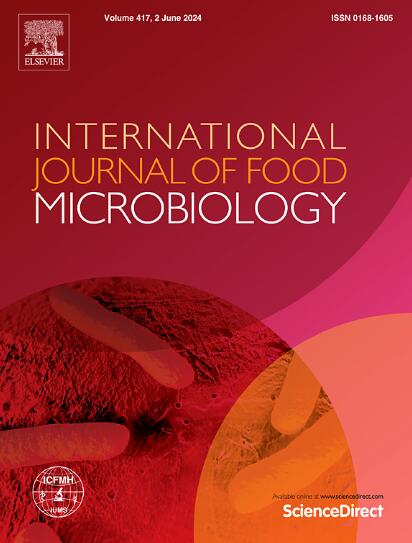Effect of CFEM proteins on pathogenicity, patulin accumulation and host immunity of postharvest apple pathogens Penicillium expansum
IF 5.2
1区 农林科学
Q1 FOOD SCIENCE & TECHNOLOGY
International journal of food microbiology
Pub Date : 2025-03-31
DOI:10.1016/j.ijfoodmicro.2025.111180
引用次数: 0
Abstract
Penicillium expansum is a significant post-harvest pathogenic fungi on most pome fruits. Common fungal extracellular membrane (CFEM) proteins, as effectors, contribute to virulence and manipulate host immunity. However, the CFEM proteins in P. expansum have not been identified and functionally studied. In this study, we screened two P. expansum CFEM proteins, PeCFEM5 and PeCFEM8, whose expression was highly up-regulated during postharvest apple infection. Growth and pathogenicity of P. expansum were characterized by knockout and complementary of PeCFEM5 and PeCFEM8. Deletion of PeCFEM5 and PeCFEM8 resulted in changes in spore development and increased resistance to cell wall integrity stress. The lesion spots on apple and pear fruit inoculated with P. expansum gradually expanded and deepened in color. The ΔPeCFEM5 and ΔPeCFEM8 strains reduced lesion diameter on apple fruit by 47 % and 29 %, respectively, compared with the WT strains. Detection of patulin accumulation by high-performance liquid chromatography (HPLC) revealed that deletion of PeCFEM5 or PeCFEM8 suppressed patulin content in medium and apples, and patulin biosynthesis-related genes were down-regulated. The PeCFEM5 and PeCFEM8 were also confirmed as effector proteins capable of suppressing the cell death triggered by BAX and the expression of plant defense genes in Nicotiana benthamiana. Phytohormone ELISA assays showed that jasmonic acid levels were reduced, but salicylic acid levels were increased by transient expression of PeCFEM5 or PeCFEM8 in the host plant. These results indicate that PeCFEM5 and PeCFEM8 effectors are crucial for pathogenicity, patulin biogenesis, and modulating host plant immunity.
CFEM蛋白对苹果采后病原菌扩张青霉致病性、展霉素积累及宿主免疫的影响
膨胀青霉是大多数梨果实上重要的采后致病真菌。常见的真菌胞外膜(CFEM)蛋白,作为效应器,有助于毒力和操纵宿主免疫。然而,目前尚没有对该蛋白进行鉴定和功能研究。在本研究中,我们筛选了两个在苹果采后侵染过程中表达高度上调的蛋白PeCFEM5和PeCFEM8。通过敲除PeCFEM5和PeCFEM8基因并进行互补,研究了该菌的生长和致病性。PeCFEM5和PeCFEM8的缺失导致孢子发育发生变化,对细胞壁完整性胁迫的抵抗力增强。苹果和梨的病斑逐渐扩大,颜色逐渐加深。与WT菌株相比,ΔPeCFEM5和ΔPeCFEM8菌株对苹果果实的损伤直径分别降低了47%和29%。高效液相色谱法检测棒曲霉素积累量发现,缺失PeCFEM5或PeCFEM8可抑制培养基和苹果中棒曲霉素含量,且棒曲霉素生物合成相关基因下调。PeCFEM5和PeCFEM8也被证实是能够抑制BAX引发的细胞死亡和植物防御基因表达的效应蛋白。植物激素ELISA检测结果显示,瞬时表达PeCFEM5或PeCFEM8可降低茉莉酸水平,提高水杨酸水平。这些结果表明,PeCFEM5和PeCFEM8效应物在致病性、展霉素生物生成和调节寄主植物免疫中起着至关重要的作用。
本文章由计算机程序翻译,如有差异,请以英文原文为准。
求助全文
约1分钟内获得全文
求助全文
来源期刊
CiteScore
10.40
自引率
5.60%
发文量
322
审稿时长
65 days
期刊介绍:
The International Journal of Food Microbiology publishes papers dealing with all aspects of food microbiology. Articles must present information that is novel, has high impact and interest, and is of high scientific quality. They should provide scientific or technological advancement in the specific field of interest of the journal and enhance its strong international reputation. Preliminary or confirmatory results as well as contributions not strictly related to food microbiology will not be considered for publication.

 求助内容:
求助内容: 应助结果提醒方式:
应助结果提醒方式:


